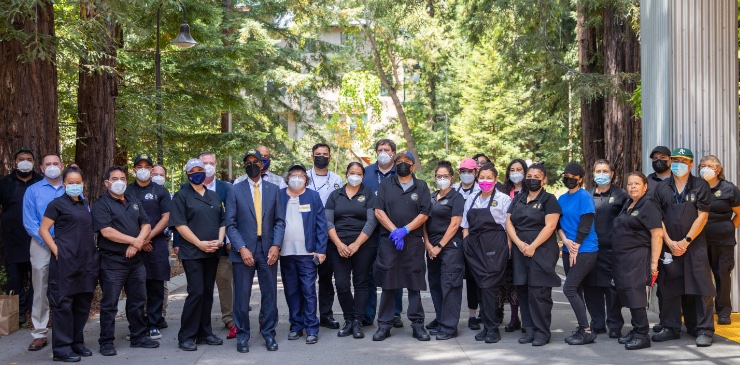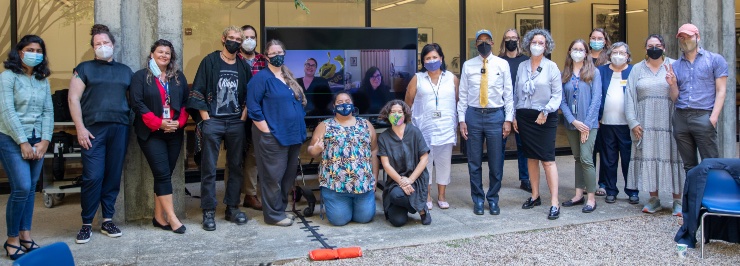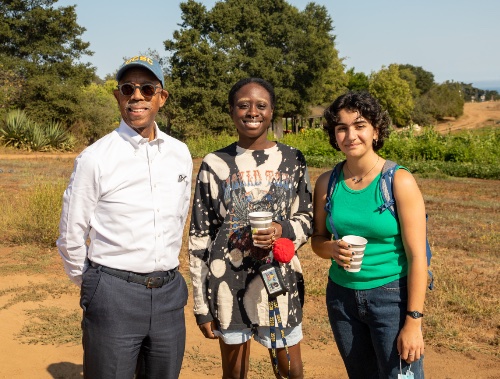Campus News
With a focus on student success and research impact, UC President Michael V. Drake visits UC Santa Cruz
The daylong visit included meetings with faculty, staff, and students to learn more about research, teaching, and learning at UC Santa Cruz—and the important work that supports the university’s mission as a Hispanic-Serving research university centered on student success.
University of California President Michael V. Drake and his wife, Mrs. Brenda Drake, visited UC Santa Cruz to learn more about the campus’s work on advancing the success of undergraduate and graduate students.
The daylong visit included meetings with faculty, staff, and students to learn more about research, teaching, and learning at UC Santa Cruz—and the important work that supports the university’s mission as a Hispanic-Serving research university centered on student success.
“It was wonderful to visit UC Santa Cruz and hear about the latest achievements of the Banana Slug community,” Drake said. “I’m grateful for the campus’s leadership on so many issues, from social justice to climate change, and am looking forward to seeing all the progress to come.”

Since his appointment in 2020 to lead the University of California, Drake has sought to tour each of the system’s 10 campuses, five medical centers, and three nationally affiliated labs. Drake has a long and distinguished career in higher education, including serving as chancellor of UC Irvine for nine years, from 2005 to 2014, and as the systemwide vice president for health affairs from 2000 to 2005. He served as president of The Ohio State University from 2014 until his return to UC. Drake was last on campus in May, delivering a speech at the dedication ceremony for John R. Lewis College.
“It was wonderful to have President Drake at UC Santa Cruz,” said Chancellor Cynthia Larive. “While he’s visited before, this was an opportunity for him to more deeply interact with students, staff and faculty, and to learn about the intentional work we are doing to support and mentor diverse students pursuing degrees in science and engineering, to lead aquaculture into a more sustainable future, and to create spaces for student creativity and innovation.”
The July 29 visit began with an outdoor lunch at the Coastal Science Campus with undergraduates conducting research through STEM Diversity Research Programs. The programs promote diversity in the sciences by providing direct services that support students through STEM (Science, Technology, Engineering, and Math) research training, professional development, and academic support.
STEM Diversity Programs Director Yulianna Ortega said it was wonderful to have candid conversations with Drake and Larive and to hear about their personal and professional journeys, experiences that resonate and inspire UCSC students.
“These interactions with leadership are very important for our students to have,” Ortega said, “because it empowers their sense of leadership and to see themselves as agents of change, shaping the very structural influences that determine their academic, personal, and professional lives.”
From there, Drake headed to the residential campus to see progress on the Kresge College renewal. The first phase, set to be completed in the coming academic year, includes new residential and academic buildings. When the expansive project is completed, it will include housing for approximately 970 undergraduates, about 600 more beds than what the college originally held.
At College Nine and John R. Lewis College, Drake thanked a team of employees who work in the campus dining halls. The group included some of the employees who have helped to serve and support students through both the pandemic and the wildfires in the summer of 2020 that led to a first-ever campus evacuation.
“You have been dedicated to coming to campus every day to keep the campus moving and you’ve created the opportunity for our students to learn, for our faculty to teach and do their research, and for all of us to live,” Drake said. “You are the University of California.”
Drake met with a group of faculty members gathered on the lawn at the Cowell College Provost House. Through a conversation facilitated by Center for Innovations in Teaching and Learning Director Jody Greene and Vice Chair of the Academic Senate Patty Gallagher, the faculty shared their challenges teaching and conducting research through the pandemic and their impactful work to improve their pedagogy to support learning equity.
Continuing the focus on teaching and learning, Drake met with students and professional staff who work in the campus libraries and talked about the library’s central role as a place for the campus community.

Community Archivist Rebecca Hernandez asked Drake to share a memorable library experience. He offered three, sharing how the university library was where his son, leaving home for law school, met his future wife; how at Ohio State he participated in a discussion, held at the library, about the future of higher education; and how as a pre-med undergraduate at Stanford University he would study at the university’s art library, finding focus as he studied organic chemistry.
The conversation expanded to focus on how libraries are transforming to be a space for students to collaborate with one another.
“The library is a place to be yourself, and start creating things and interact with people,” said Sky Casey, an undergraduate student employee in the Digital Scholarship Innovation Studio. The space is designed to create a community and to democratize access to technology. The resources include tools, such as 3-D printers and laser cutters.
Drake concluded his campus tour with a visit to the UC Santa Cruz Farm, where he learned about sustainable aquaculture and how the campus is working to support the basic needs of students.
Environmental Studies Professor Anne Kapuscinski talked about her team’s work to make aquaculture more sustainable. As the world’s appetite for fish increases, Kapuscinski is leading efforts to reduce the environmental impact of farmed fish. Her team is developing an ocean-friendly algae-based food for farmed fish. Many fish farms use fishmeal and fish oil extracted from wild fish like anchovies and sardines, putting those populations in jeopardy.

With students Mary Ayanwale and Nessa Fakrai, Center for Agroecology Education and Research Specialist Tim Galarneau talked about innovative programs to meet students’ basic needs, including the Cowell Coffee Shop, a non-transactional cafe and choice-based food pantry, and the CASFS Mobile Food Hub.
The 16-foot food trailer will serve lunch, distribute produce, and travel around campus to offer food at special events and workshops. The trailer will have a rotating menu that seeks to celebrate the diverse culinary diaspora of students and be rooted in the use of local, seasonal produce.
“We spend a lot of time thinking about the whole student,” said Center for Agroecology Education and Research Specialist Tim Galarneau, who also co-chairs the UC Systemwide Basic Needs Committee. “We are working to foster a supportive campus climate and a sense of belonging among students.”
From housing and basic needs to research opportunities and innovative teaching, Drake saw firsthand how the university is focused on supporting its students and making sure they have a transformative experience at UC Santa Cruz and are prepared for successful careers and meaningful lives after graduation.